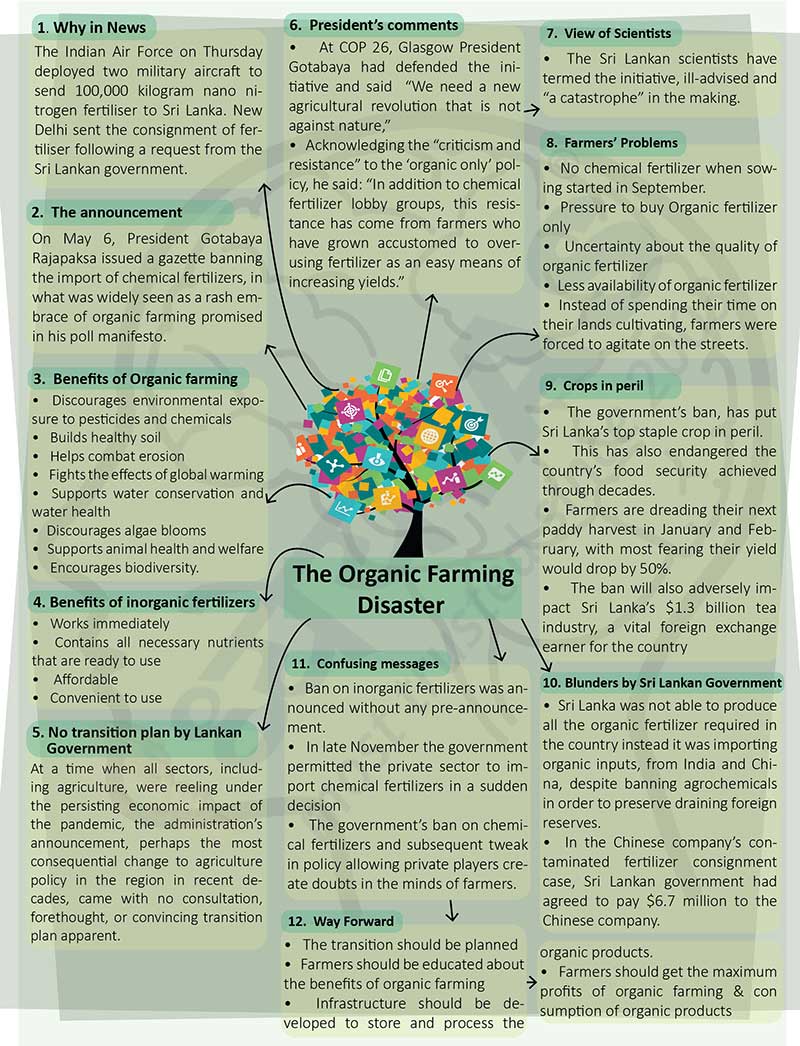Brain-booster /
20 Jan 2022
Brain Booster for UPSC & State PCS Examination (Topic: The Organic Farming Disaster)

Why in News?
- The Indian Air Force on Thursday deployed two military aircraft to send
100,000 kilogram nano nitrogen fertiliser to Sri Lanka. New Delhi sent the
consignment of fertiliser following a request from the Sri Lankan
government.
The announcement
- On May 6, President Gotabaya Rajapaksa issued a gazette banning the
import of chemical fertilizers, in what was widely seen as a rash embrace of
organic farming promised in his poll manifesto.
Benefits of Organic farming
- Discourages environmental exposure to pesticides and chemicals
- Builds healthy soil
- Helps combat erosion
- Fights the effects of global warming
- Supports water conservation and water health
- Discourages algae blooms
- Supports animal health and welfare
- Encourages biodiversity.
Benefits of inorganic fertilizers
- Works immediately
- Contains all necessary nutrients that are ready to use
- Affordable
- Convenient to use
No transition plan by Lankan Government
- At a time when all sectors, including agriculture, were reeling under
the persisting economic impact of the pandemic, the administration’s
announcement, perhaps the most consequential change to agriculture policy in
the region in recent decades, came with no consultation, forethought, or
convincing transition plan apparent.
President’s comments
- At COP 26, Glasgow President Gotabaya had defended the initiative and
said “We need a new agricultural revolution that is not against nature,”
- Acknowledging the “criticism and resistance” to the ‘organic only’
policy, he said: “In addition to chemical fertilizer lobby groups, this
resistance has come from farmers who have grown accustomed to overusing
fertilizer as an easy means of increasing yields.”
View of Scientists
- The Sri Lankan scientists have termed the initiative, ill-advised and “a
catastrophe” in the making.
Farmers’ Problems
- No chemical fertilizer when sowing started in September.
- Pressure to buy Organic fertilizer only
- Uncertainty about the quality of organic fertilizer
- Less availability of organic fertilizer
- Instead of spending their time on their lands cultivating, farmers were
forced to agitate on the streets.
Crops in peril
- The government’s ban, has put Sri Lanka’s top staple crop in peril.
- This has also endangered the country’s food security achieved through
decades.
- Farmers are dreading their next paddy harvest in January and February,
with most fearing their yield would drop by 50%.
- The ban will also adversely impact Sri Lanka’s $1.3 billion tea
industry, a vital foreign exchange earner for the country
Blunders by Sri Lankan Government
- Sri Lanka was not able to produce all the organic fertilizer required in
the country instead it was importing organic inputs, from India and China,
despite banning agrochemicals in order to preserve draining foreign
reserves.
- In the Chinese company’s contaminated fertilizer consignment case, Sri
Lankan government had agreed to pay $6.7 million to the company.
Confusing messages
- Ban on inorganic fertilizers was announced without any pre-announcement.
- In late November the government permitted the private sector to import
chemical fertilizers in a sudden decision
- The government’s ban on chemical fertilizers and subsequent tweak in
policy allowing private players create doubts in the minds of farmers.
Way Forward
- The transition should be planned
- Farmers should be educated about the benefits of organic farming
- Infrastructure should be developed to store and process the organic
products.
- Farmers should get the maximum profits of organic farming & con sumption
of organic products









